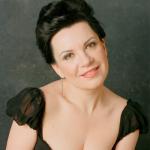
The international star of opera speaks about her new solo programme at the Concert Hall of the Mariinsky Theatre, her favourite roles and her recording of Aida.
– Could you please tell us why you chose such a complex programme for your recital?
I've wanted to perform romances by these two contemporary composers in one concert programme with Dmitry Yefimov for a long time. If we hear Sergei Rachmaninoff’s works quite often, sadly you can’t say the same of Nikolai Medtner: he is undeservedly little-performed, but he wrote music of incredible beauty and philosophical depth. Their fates were similar in that they both emigrated, taking with them the culture of the intelligentsia of pre-revolutionary Russia to America and Europe.
– Recently there has been a great deal of news about you in the foreign press. But at the Stars of the White Nights festival this year you provided a generous gift for your fans with your appearances in a series of performances and a recital with a new programme.
Yes, I’ve really had a lot of performances abroad – mainly in Verdi’s operas. And this season I made my debut at the Wiener Staatsoper as Donizetti’s Anna Bolena. But I’d really like to expand my Russian repertoire. I dream of Clytemnestra in Taneyev’s Oresteia and Lyubasha in Rimsky-Korsakov’s The Tsar’s Bride. This summer one of my dreams came true – at the Mariinsky Theatre I sang one of the most complex roles written for a dramatic mezzo-soprano – the role of Lyubov in the opera Mazepa by Tchaikovsky in a performance conducted by Valery Gergiev, for which I am eternally grateful to him!
– It seems rather odd that to date at the Mariinsky Theatre you have not performed the role of Marfa in Musorgsky’s Khovanshchina, your voice has long been ready for it and dramatically you would find the perfect embodiment.
I’ve been offered the role of Marfa, but I’d really like to “grow” the role here, at the Mariinsky Theatre. I hope it’s on the not-too-distant horizon – for me it would embody one of my most cherished dreams. But, as the famous American mezzo-soprano Marilyn Horne wrote in her memoirs, everything in her life came at the right time. The acclaimed German singer Lilli Lehmann sang well into her old age, retaining the suppleness and beauty of her voice. I prefer to take the point of view that it’s better not to tackle everything at the same time but to let your voice serve you as long as possible, I want my voice to retain its elasticity, beauty, dazzle and power. The art of singers who are older but sound young may truly be called “high class”. For me, one such example is my teacher Yevgenia Stanislavovna Gorokhovskaya.
– Last season saw the release of Verdi’s Aida with you and one of the present day’s greatest conductors, Antonio Pappano, as well as a stellar cast of soloists including the tenor Jonas Kaufmann and the soprano Anja Harteros. Was that Aida the latest word in terms of interpreting this “textbook” opera?
I’ll openly admit that this was unexpected, but I’d wanted it for a long time. I received the invitation from maestro Antonio Pappano several years ago. Prior to that I had worked with him at the Salzburg Festival in Verdi’s Don Carlo and sung under him in Verdi’s Requiem with the Accademia Nazionale di Santa Cecilia. I also felt a sense of duty in that it had been many years since Aida had been recorded in the studio. Our recording sessions lasted just over ten days, it involved hours-long sets every day. But I never felt tires at all. You got a positive mood during the recording process thanks to the fruitful communication between the musicians. The recording really was freely inspirational. No-one had any problems with their voices – it was all so natural. It was an ensemble of super-professionals.
– Not so long ago at the Mariinsky-II you performed as Carmen in a new style – without violent emotions or frosty pathos, very intimate and sincere. What led you to such an unexpected yet incredibly interesting and deep reading of the role?
I truly believe that I brought my performance as Carmen as close as possible to what the composer would have wished to hear. In any performance there is always a place for intimacy, you shouldn’t be afraid of using your mezzo voce, the voice has to be insinuating and yet at the same time it has to be relatively simple and easy, as in Carmen’s first aria – the Habanera. Everyone has become used to a loud sound, but I wanted to sing what Georges Bizet and Prosper Mérimée wrote, to share my own experience of understanding this mysterious role. It did it the way my heart, feelings and experience told me. And I’ve a lot of experience of working on Carmen with different musicians, I’ve done about fifteen productions, including an appearance at the famous Arena di Verona festival. The role was born as a result of a lengthy process that lasted many years. In December last year I was able to perform as Carmen with maestro Valery Gergiev, and that was a tremendous event in my life.
Speaking with Vladimir Dudin